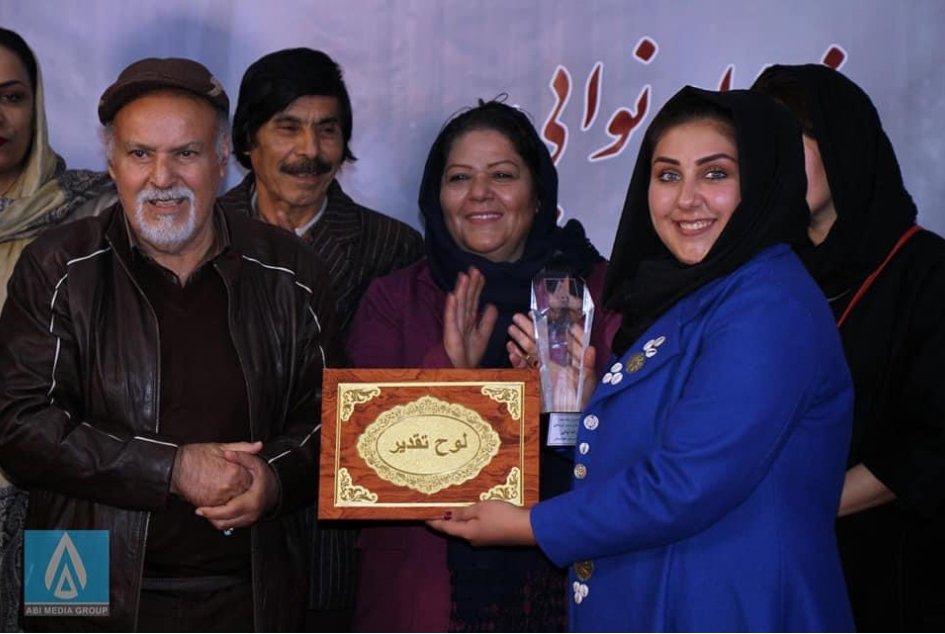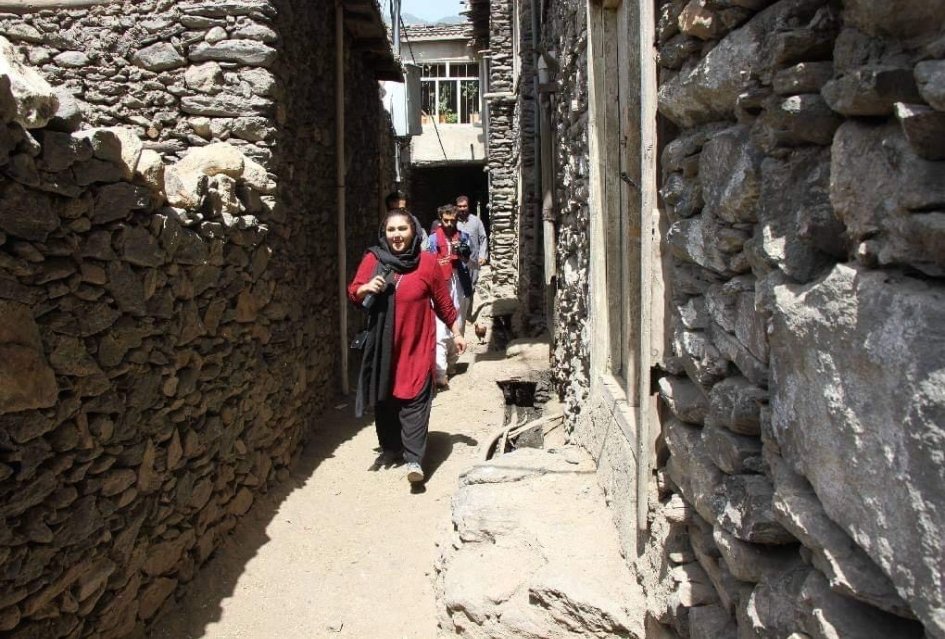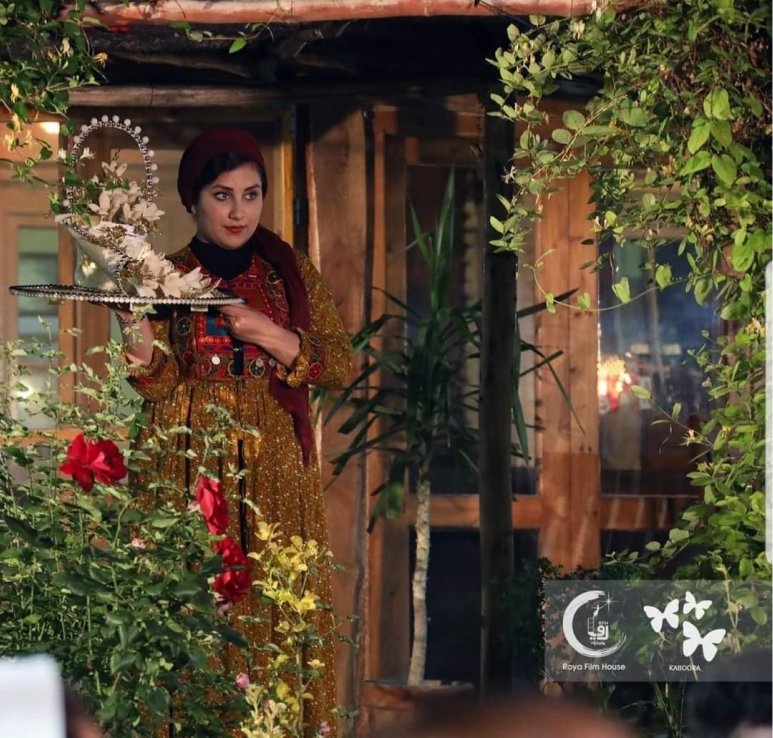Farzana
(FRANCE)
فرزانه
“It is over. Farzana’s story and all her dreaming cannot endure in Afghanistan. Today, Farzana is a refugee, a person who has lost everything.”
For twenty years in Afghanistan, a generation of citizens experienced a life of progress and change. Farzana’s story is exemplary of this chapter in history. She is an award-winning actor and her films and TV series have been viewed worldwide. She had dedicated her life to Afghanistan’s film and television industry. She longed to remain in the country but was forced to leave in 2021. Listen below, as she revisits memories from Afghanistan and describes life in exile.
Q1: What is a single memory or story you remember from Afghanistan?
At eleven o’clock in the morning, I was sitting in the office when I was invited to an emergency meeting. Parwan was flooded and we had to go to the province. At the time, I was already deeply involved with another project that was important to me, but I gave up and physically shifted focus to Parwan. The situation I witnessed was terrible. I felt like I was one of those dead bodies. You had the impression that the houses had been pulverized. People said they did not even see the water, only the stones that had come and destroyed everything. It was unbelievable that the metal walls were misshapen too. A friend of mine then called us to go and retrieve a dead body from a house. When we carried the body, his hand remained stuck in the mud. My friend took the body and moved it. Someone else came to me and cried that his sister, mother, and brother had been killed by the storm and he could not do anything about it.
I did not live through the previous Taliban era because I was in Iran — I endured less misery than the previous generation — but this was a horror that I watched. And when I returned home from Parwan, I felt that something bad was happening and that my whole family was at risk of being taken away. I checked the rooms of my family many times and said to myself that this is just a thought, not reality.
A portrait of Farzana in crimson published in December 2021, after her evacuation to France.
At the time, I would also go around to neighbors’ houses offering help as part of our organization’s work. A beautiful teenage girl came and held my hand and said, “Aunty, tell my mother to not send me to work, men are touching my body.” I went to her mother and told her not to send her daughter to work. “It’s something she can’t articulate to you, but you shouldn’t send her.” The mother replied, “I understand, I know, but what should I eat if I do not send her? My in-law’s family is not allowing me to work. There is no other way but for her to go to work.” This little girl was too young. She experienced sexual assault every day.
During my work with Jadai Ensanyat [A Path for Humanitarian Path] that was my own initiative — focusing on sexual violence. I faced and saw many tragedies. I became depressed and could not continue my work despite my family’s persistence. But I did continue some work and started taking medication for depression.
A still from one of Farzana’s films.
Q2: Tell us the exact moment you decided to leave Afghanistan.
A month before the fall of Kabul, I received a phone call. He said, "I am Siddiq Barmak." I got your name on the list to be transferred to France. I said, Mr. Barmak! I do not intend to leave my country. "Afghanistan is no longer the place you want to live," he said. You must leave the country. Let's go to another country temporarily, the homeland is ours. You can go whenever you want. I said right. I told my colleague Sangar that something like this had happened.
I wanted to go to the dentist when one of my friends called and said, "Ms. Nawabi, do not leave the house because Taliban are at the gate of Kabul." I went to Facebook when I saw Sahra Karimi on the street and she said that Taliban had entered. I turned on the TV and saw Taliban sitting in the Presidential Palace. I could not believe it. I shook my head. I called Mohsen Makhmalbaf. I said, Mr. Makhmalbaf! Taliban came to Kabul. He said “I understand.” I said what should I do? He said go to the airport. I told my family to pack up and leave to the airport.
Farzana delivering a speech at a film festival in Kabul.
A month before the fall of Kabul, I received a phone call. The man said, “I am Siddiq Barmak. I have your name on the list to be transferred to France.” I told him, “Mr. Barmak, I do not intend to leave my country.” “Afghanistan is no longer the place you want to live,” he said. “You must leave the country. Even if temporarily. The homeland will still be ours. You can go whenever you want.” I said okay. I then told my colleague Sangar about all this.
Weeks later, I wanted to go to the dentist when a friend called and said, “Ms. Nawabi, do not leave the house because the Taliban are at the gate of Kabul.” I logged on to Facebook and saw Sahra Karimi on the street saying that the Taliban had entered. I turned on the TV and saw members of the Taliban sitting in the Presidential Palace. I could not believe it. I shook my head. I called Mohsen Makhmalbaf. “Mr. Makhmalbaf, the Taliban have come to Kabul.” “I know,” he said. “What should I do?” I asked. He advised me to go to the airport. I told my family to pack up and leave.
I then received a call from a dear friend in the police force who told me I should not leave the house without a burqa and that I should change my location. “At the police station, people came whom I do not know, and they may come to your gate, and I won’t be able to do anything. If you can, get out of Afghanistan.” I could not believe it. He was the Taliban commander and intelligence, and we did not know it before. It was here that I realized the depth of the tragedy.
I called another friend and told him I was going to leave. Then I headed to the airport. I saw the Taliban for the first time up close. How does it feel — hearing about something all the time and now finally having to face it?
I loved my office very much. I loved my job. I loved all the awards I received. I went back to the office to see everything one more time. I realized, leaving the country, that I, Farzana, would never be the same again. After eight years of dedicated work with my colleague Sangar, I said goodbye and entered the airport. I could not bring my family. At one point, I asked myself: You are really going to leave? You who had always said, I will stay here. Here I am proud. Here I am following my dreams.
It is over. Farzana’s story and all her dreaming cannot endure in Afghanistan. Today, Farzana is a refugee, a person who has lost everything.
Farzana accepting an honor for her work.
Farzana documents her journey from Kabul International Airport to France in August 2021.
Q3: What is something important that you brought with you? Or what is something you wanted to bring but could not?
I wanted to bring eleven years of my professional life with me. But is that even possible? Eleven years were invested into my professional growth. I sacrificed my childhood. When girls my age were thinking about gardening, clothes, or school lessons, I was thinking about which script to read, which director to work with, which script looked like a good story. I have invested eleven years in this field, but it all fell to the ground. I want to remain that accomplished person, but I think I may never return to her land.
Farzana at Lajward Film Festival in Kabul.
Q4: If you could send a message that will be heard in thirty years, what would it be?
I want everyone to understand that we wanted to remain in Afghanistan. This was not our decision. We had a good life, work, and friends. We went door to door taking care of one another. We want you to understand that it was not in our hands. Whoever reads or listens to this story, I want you to understand that I take my phone, put my headphones on, put on a black coat and glasses, go here and there, but I do not understand the language, I have no money, no job, no higher education in France, nothing. It’s as if I was born in my twenties.
So, please be vigilant, do not let the next generation be like us. Raise the next generation so that they can enjoy the world. Our fathers tried for many years to prevent our oppression. I always told my father, “It’s good that you know who your enemy is.”
We did not know our enemy. There was an explosion, and we did not understand who hit us. Our generation was betrayed. If we were fooled, you should not be. If we were not raised well, you should take better care with the next generation.
Farzana in Kabul.
An advertisement for Roya Film House.
Next Story
روایت بعدی
“I want them to say, “Come back!” I want them to call us back and that’s it. Tell us it’s time to come back.”









